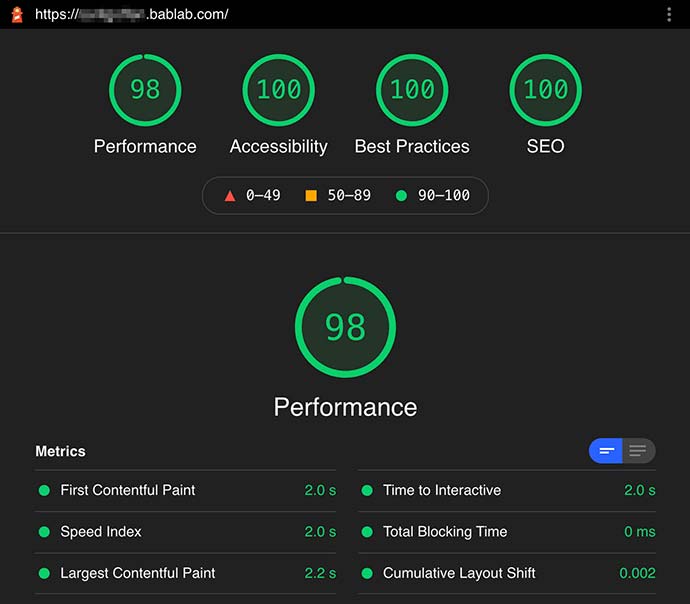Bablab websites have outstanding performance with search engines.
Search Engines Optimization directly affects the amount and the quality of your website visitors. The better optimized your website - the more visitors it has, and more chances for you to be contacted.
Bablab developed unique and powerful methods optimizing your website SEO for today's best practice, leading to exceptional performance with search engines.
Performance and loading speed
A Bablab portfolio website loads in 2 seconds. That’s the fastest loading time on the internet for portfolio websites. Having a fast loading website is one of the most important factors in your website ranking.
This is how a Bablab website performs on Google's Lighthouse audit:

Loading images wisely
In order to speed up pages loading, Bablab automatically implements modern technologies when placing big images in pages markup:
- Lazy-loading images: images are loaded only when the visitor scrolled to the page area they are at.
- Sizes-loading images: adapting loaded images size to the actual required real-estate on page.
This saves a lot of time for your visitors, and also dramatically reduces page load time, improving your website rank.
Here is an example tag for a Bablab image, part of a gallery page:
loading="lazy"
data-srcset=" https://link/to/small.jpg 200w,
https://link/to/medium.jpg 506w,
https://link/to/big.jpg 724w "
src="https://link/to/small.jpg"
data-srcfull="https://link/to/big.jpg"
data-natwidth="724"
data-natheight="1000"
data-desc="Chef Jose Avillez in his restaurant"
data-label="Chef Jose Avillez"
data-tags="Restaurant, chef, Jose Avillez"
data-country="Portugal"
data-city="Lisbon"
data-parent-fit="cover"
data-sizes="auto"
style="object-fit: cover; width: 100%;"
alt="Chef Jose Avillez in his restaurant. in Lisbon, Portugal">
Notice how several sizes are available (pink), allowing the browser to choose the right size.
Also, the ALT tag (orange) is composed of the data attributes (blue), extracted from the image metadata.
Structured data - schema tags
Structured data is a system that helps search engines categorize and index your content. Schema.org
is a project that provides a particular set of agreed-upon definitions for structured data (microdata) tags.
Bablab implements several schema tags automatically:
- Organization and Person will associate your website with your social accounts.
- Website and Breadcrumb enhance the way your website will appear in search results by providing breadcrumb of the navigation path to the page.
- Images and License Information is added to each gallery page. This tells people seeing your photos on Google images search, that license information is available for the image, and provides a link to the license in the Image Viewer, which offers more detail on how someone can use the image.
OpenGraph and Twitter Card
Facebook Open Graph and
Twitter Cards
allow businesses to represent their content as rich objects in the social graph.
For example, the image and description are displayed when a link is shared in messaging and on the web:

This is beneficial from a branding perspective, as it makes the content on your pages much easier to share and engage with on each of those independent platforms.
Bablab implements both Open Graph and Twitter Cards on all websites.